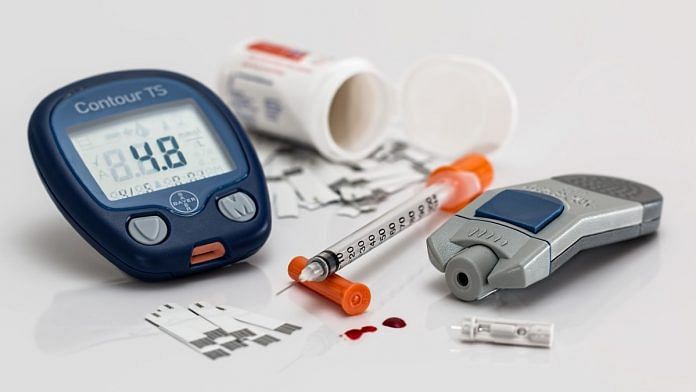New Delhi: The novel coronavirus may trigger type-1 diabetes in patients who are otherwise non-diabetic, researchers have said, citing new emerging evidence.
The claims have been made in a letter to the editor of the New England Journal of Medicine (NEJM) by 15 researchers from from the King’s College London, the Australian Monash University, Imperial College in London, Technical University of Dresden in Germany and Singapore’s Nanyang Technological University, among others.
The claims have also been made in a news article in the journal, Nature.
According to the scientists, one possible mechanism that leads to development of type-1 diabetes due to Covid is that the body’s own immune system, in response to the virus, starts destroying beta cells, which produce insulin in the pancreas.
Insulin, a hormone produced by the pancreas, helps our body to use sugar (glucose) from carbohydrates in the food that we eat for energy or to store glucose for future use.
With destruction of beta cells in our body, however, the amount of insulin produced reduces, compromising the body’s ability to control blood sugar levels, causing type-1 diabetes.
A study published by the researchers in Beijing in March had found higher chances of developing diabetes among patients in the previous SARS outbreak.
Covid-19 is a form of the SARS virus.
Also read: RT-PCR, antigen, antibody, TrueNAT — all you need to know about the different Covid tests
Investigating relationship between diabetes and Covid-19
According to the letter published in the NEJM on 12 June, “there is a bidirectional relationship between Covid-19 and diabetes”.
“On the one hand, diabetes is associated with an increased risk of severe Covid-19,” the letter states. “On the other hand, new-onset diabetes and severe metabolic complications of pre-existing diabetes… have been observed in patients with Covid-19.”
The article in Nature found that now a growing number of researchers think that “diabetes doesn’t just make people more vulnerable to the coronavirus, but that the virus might also trigger diabetes in some”.
The article cites laboratory experiments and anecdotes by Paul Zimmet, who studies metabolic diseases at Monash University in Melbourne, Australia. Zimmet is also among the scientists who have written the letter to NEJM.
Researchers like Zimmet have evidence on connection of Covid-19 with diabetes based on a few patients who “have spontaneously developed diabetes after being infected with SARS-CoV-2, and on evidence from dozens more people with COVID-19 who have arrived in hospital with extremely high levels of blood sugar and ketones, which are produced from fatty deposits in the liver”.
When the body doesn’t make enough insulin to break down sugar, it uses ketones as an alternative source of fuel, the scientists have said.
“In science, sometimes you have to start off with very small evidence to chase a hypothesis,” Zimmet told Nature.
The possible mechanism
The letter published in NEJM mentions that the “severe acute respiratory syndrome coronavirus 2 (SARS-CoV-2) binds to angiotensin-converting enzyme 2 (ACE2) receptors, which are expressed in key metabolic organs and tissues, including pancreatic beta cells, adipose tissue, the small intestine, and the kidneys”.
It emphasises that the link between Covid-19 and onset of diabetes is possible. “It is plausible that SARS-CoV-2 may cause pleiotropic alterations of glucose metabolism that could complicate the pathophysiology of preexisting diabetes or lead to new mechanisms of disease.”
The article published in Nature gave an instance of an 18-year-old German student, Finn Gnadt, who had contracted the Covid-19.
“Gnadt thought he had endured the infection unscathed, but days later, he started to feel worn out and exceedingly thirsty,” the article said. “In early May, he was diagnosed with type 1 diabetes, and his physician, Tim Hollstein at the University Hospital Schleswig-Holstein in Kiel, suggested that the sudden onset might be linked to the viral infection.”
Also read: Most children have mild form of Covid-19, face minute risk of death, Lancet study finds






